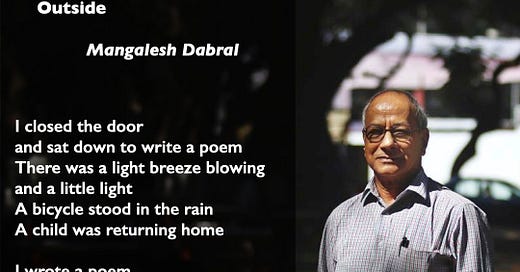On December 9th, the pandemic claimed the life of another great artist - Mangalesh Dabral. The news came as a shock to many in the Indian poetry community who have loved and known the beloved poet, essayist and translator. The tributes flowed in from young and old artists across the country. What stood out in many tributes was that his work and presence had acquired a kind of surreal immortality. He made his mark in the landscape of Indian literature, having his work translated into several languages, and always keeping his language simple and accessible. Dabral exemplified through his work a desire that most poets have - to be heard. and heard by as many ears as possible, in as many tongues.
An artist who let his pen poke holes in the grand narratives of fascists, he mentions, in an interview with the Indian Express, that his 2014 work Tanashahi was inspired by Prime Minister Narendra Modi’s oratory style. “His clothing inspired another poem, Folk Tale. In it, a king of a fictional land is known to do things in the right manner, and he says he doesn’t like muck of any kind. He is particular about what he wears and changes his clothes often, sometimes twice or thrice a day, because he feels his clothes have a stain. And when his reign eventually ends, his clothes go down in history. His era is remembered as the time of dirty and stained clothes,” he added. In fact, he returned his Sahitya Akademi award along with other poets and artists in protest against the rising communal violence in the country.
These words from his introduction to This Number Does not Exist, talk about the changing meaning of home that every poet feels and writes about.
“My poetry was born in the mountains, lived among the stones and sang of water, clouds, trees, and birds; but soon it migrated to the cities where the world was not so simple and innocent despite all its attractions, its wide and ever-lit roads, squares and lamp posts, which looked like the signifiers of a new civilisation. It was filled with the strains between the loss of native spaces and the difficulties of coming to terms with the place of refuge.”
Rest in Poetry Mangalesh Dabralji.
Note: The poem I’m sharing is featured in the brilliant anthology of Indian poetry - ‘These, my words’ edited by Eunice De Souza & Melanie Silgardo.
Discussion about this post
No posts



